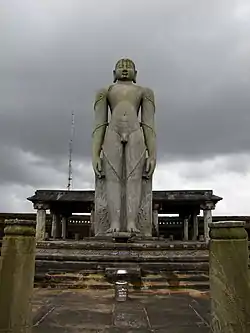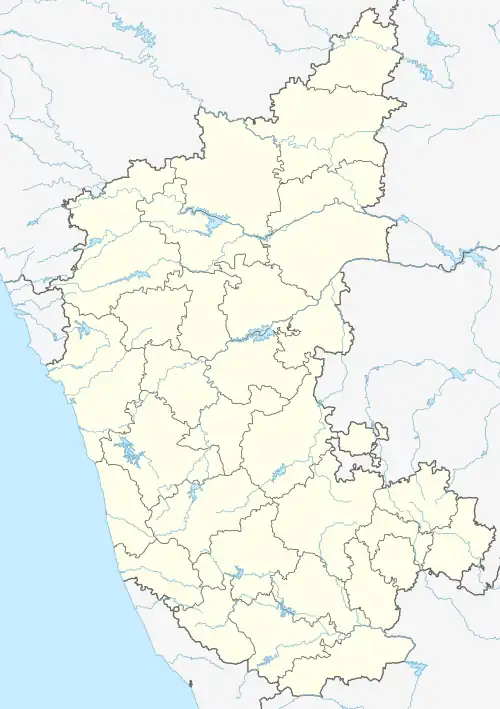| Gommateshwara (Bahubali) | |
|---|---|
ಗೊಮ್ಮಟೇಶ್ವರ ಪ್ರತಿಮೆ ಕಾರ್ಕಳ ' | |
 The 42 feet (13 m) high monolithic statue of Bahubali | |
| Religion | |
| Affiliation | Jainism |
| Deity | Bahubali |
| Festivals | Mahavir Jayanti, Das Lakshana |
| Governing body | Karkala Jain Math |
| Location | |
| Location | Karkala, Karnataka |
 Shown within India  Gommateshwara statue, Karkala (Karnataka) | |
| Geographic coordinates | 13°12′13.6″N 75°00′20″E / 13.203778°N 75.00556°E |
| Architecture | |
| Creator | Veera Pandya Bhairarasa Wodeyar |
| Date established | 1432 C.E. |
| Temple(s) | 18 |
Gommateshwara statue, Karkala (ಗೊಮ್ಮಟೇಶ್ವರ ಪ್ರತಿಮೆ ಕಾರ್ಕಳ) is located at Karkala in the Indian state of Karnataka. It is the second tallest statue of Bahubali in the world with the largest statue located at Shravanabelagola.
History
Gommateshwara statue at Karkala was built in 1432 CE by Veera Pandya Bhairarasa Wodeyar of Santara dynasty on advice from Lalitakirti, the Bhattaraka of Karkala Jain Matha.[1][2][3][4][5] The statue was inspired from the larger Gommateshwara statue at Shravanabelagola built in 983 CE.[6]
Karkala Gommatesvara Charitre, composed by Chadura Chandrama in 1686 CE, is poem describing the mahamastakabhisheka at Karkala.[7]
Statue
The idol of Lord Bahubali, carved out of a single rock of granite,[8] is 42 feet (13 m) tall,[9] 10.33 feet (3.15 m) wide and is said to be the second tallest statue of Bahubali in the world.[10][4][11] The idol is placed on a 5 feet (1.5 m) pedestal and enclosed by cloistered prakaram. In the entrance room, a few sculptures of Tirthankaras are displayed. In front of the temple is a manastambha with image of Yaksha within a niche. The statue is depicted in kayotsarga posture with curly hair ringlets, large ears and palms stretching up to knees.[5] The idol weighs over 80 tonnes.[12][13] It is located 300 feet (91 m) above sea level.[14]
Gommateshwara statue at Shravanabelagola, Dharmasthala, Venur, Gommatagiri along with the one in Karkala are the five monolithic statues of Bahubali in Karnataka.[11] The monolithic colossal statues of Bahubali at Shravanabelagola, Karkala and Venur are considered as wonder of the world.[8]
Mahamastakabhisheka
Mahamastakabhisheka is organised every 12 years. As the Mahamastakabhisheka begins, consecrated water is sprinkled onto the participants by devotees carrying 1,008 specially prepared vessels (Kalashas). The statue is then bathed and anointed with libations such as milk, sugarcane juice, and saffron paste, and sprinkled with powders of sandalwood, turmeric, and vermilion. The event has been attended by multiple political personalities including D. B. Chandregowda & V. S. Ramadevi in 2002, Vajubhai Vala in 2015.[15][16]
Other temples
Neighbouring areas have 18 Jain Basadis including Chaturmukha Basadi, Karkala, and Kere Basadi, Anekere. Moodabidri is another important Jain centre near Karkala.
See also
References
Citations
- ↑ Zimmer 1953, p. 213.
- ↑ Dundas 2002, p. 129.
- ↑ Rice 1982, p. 19.
- 1 2 Singh & Mishra 2007, p. 114.
- 1 2 ASI.
- ↑ Abram & Edwards 2004, p. 252.
- ↑ Reddy 2022, p. 231.
- 1 2 Sangave 1981, p. 90.
- ↑ Jain 2021, p. 38.
- ↑ Dalal 2014, p. 246.
- 1 2 Chugh 2016, p. 378.
- ↑ Balfour 1885, p. 146.
- ↑ Pinto 2015.
- ↑ Sangave 1981, p. 89.
- ↑ Prabhu 2015.
- ↑ TNN 2002.
Bibliography
Books
- Abram, David; Edwards, Nick (2004). The Rough Guide to South India. The Rough Guides Series. Rough Guides. ISBN 9781843531036.
- Balfour, Edward (1885). The Cyclopædia of India and of Eastern and Southern Asia: Commercial, Industrial and Scientific, Products of the Mineral, Vegetable, and Animal Kingdoms, Useful Arts and Manufactures. Vol. 1. Bernard Quaritch.
- Chugh, Lalit (2016). Karnataka's Rich Heritage - Art and Architecture (From Prehistoric Times to the Hoysala Period ed.). Chennai: Notion Press. ISBN 978-93-5206-825-8.
- Dalal, Roshen (2014) [2006]. The Religions of India: A Concise Guide to Nine Major Faiths. Vol. 8 (1st ed.). London: Penguin Books. ISBN 9788184753967.
- Dundas, Paul (2002) [1992]. The Jains (2nd ed.). London and New York: Routledge. ISBN 978-0-415-26605-5.
- Jain, Kajri (8 January 2021). Gods in the Time of Democracy. Durham, North Carolina: Duke University Press. ISBN 9781478012887.
- Sangave, Vilas Adinath (1981). The Sacred Shravanabelagola (A Socio-Religious Study). Vol. 8 (1st ed.). New Delhi: Bharatiya Jnanpith.
- Singh, N.K.; Mishra, A.P. (2007). Encyclopaedia of Oriental Philosophy: Jainism. Vol. 7 (1st ed.). Delhi: Global vision publishing house. ISBN 978-8182200715.
- Reddy, Pedarapu Chenna (2022). Nagabharana: Recent Trends in Jainism Studies. Blue Rose Publishers. ISBN 978-93-56114-46-3.
- Rice, Edward P. (1982). A History of Kannada Literature (2nd ed.). New Delhi: Asian Educational Services. ISBN 9788120600638.
- Zimmer, Heinrich (1953) [1951]. Campbell, Joseph (ed.). Philosophies Of India. London: Routledge. ISBN 978-81-208-0739-6.
Web
- Prabhu, Ganesh (21 January 2015). "Bahubali abhisheka from today". The Hindu.
- Pinto, Stanley (21 January 2015). "12-year wait ends, all eyes on 42-ft-tall Karkala Bahubali". The Times of India. Mangaluru. Times News Network.
- TNN (24 February 2002). "Devotees throng for Mahamastakabhisheka". The Times of India. Mangaluru. Times News Network.
- ASI. "Jain Statue of Gomateswara, Karkala". Archaeological Survey of India. Retrieved 19 July 2021.
External links
 Media related to Jaina statue of Gomateswara, Karkala at Wikimedia Commons
Media related to Jaina statue of Gomateswara, Karkala at Wikimedia Commons